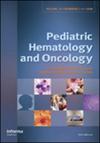Therapeutic efficacy of RAS inhibitor trametinib using a juvenile myelomonocytic leukemia patient-derived xenograft model.
IF 1.2
4区 医学
Q4 HEMATOLOGY
引用次数: 0
Abstract
Juvenile myelomonocytic leukemia (JMML) is an aggressive pediatric leukemia with few effective treatments and poor outcomes even after stem cell transplantation, the only current curative treatment. We developed a JMML patient-derived xenograft (PDX) mouse model and demonstrated the in vivo therapeutic efficacy and confirmed the target of trametinib, a RAS-RAF-MEK-ERK pathway inhibitor, in this model. A PDX model was created through transplantation of patient JMML cells into mice, up to the second generation, and successful engraftment was confirmed using flow cytometry. JMML PDX mice were treated with trametinib versus vehicle control, with a median survival of 194 days in the treatment group versus 124 days in the control group (p = 0.02). Trametinib's target as a RAS pathway inhibitor was verified by showing inhibition of ERK phosphorylation using immunoblot assays. In conclusion, trametinib monotherapy significantly prolongs survival in our JMML PDX model by inhibiting the RAS pathway. Our model can be effectively used for assessment of novel targeted treatments, including potential combination therapies, to improve JMML outcomes.利用幼年骨髓单核细胞白血病患者衍生异种移植模型研究 RAS 抑制剂曲美替尼的疗效。
幼年髓单核细胞白血病(JMML)是一种侵袭性儿童白血病,几乎没有有效的治疗方法,即使进行了干细胞移植(目前唯一可治愈的治疗方法),疗效也很差。我们开发了一种JMML患者来源异种移植(PDX)小鼠模型,并在该模型中证实了RAS-RAF-MEK-ERK通路抑制剂曲美替尼的体内疗效和靶点。通过将患者的JMML细胞移植到小鼠体内,直至第二代,建立了一个PDX模型,并使用流式细胞术确认了移植成功。JMML PDX小鼠接受曲美替尼治疗与药物对照,治疗组的中位生存期为194天,对照组为124天(P = 0.02)。曲美替尼作为RAS通路抑制剂的靶点通过免疫印迹检测显示出对ERK磷酸化的抑制作用得到了验证。总之,通过抑制RAS通路,曲美替尼单药治疗可明显延长JMML PDX模型的生存期。我们的模型可有效用于评估新型靶向治疗,包括潜在的联合疗法,以改善 JMML 的预后。
本文章由计算机程序翻译,如有差异,请以英文原文为准。
求助全文
约1分钟内获得全文
求助全文
来源期刊
CiteScore
2.60
自引率
5.90%
发文量
71
审稿时长
6-12 weeks
期刊介绍:
PHO: Pediatric Hematology and Oncology covers all aspects of research and patient management within the area of blood disorders and malignant diseases of childhood. Our goal is to make PHO: Pediatric Hematology and Oncology the premier journal for the international community of clinicians and scientists who together aim to define optimal therapeutic strategies for children and young adults with cancer and blood disorders. The journal supports articles that address research in diverse clinical settings, exceptional case studies/series that add novel insights into pathogenesis and/or clinical care, and reviews highlighting discoveries and challenges emerging from consortia and conferences. Clinical studies as well as basic and translational research reports regarding cancer pathogenesis, genetics, molecular diagnostics, pharmacology, stem cells, molecular targeting, cellular and immune therapies and transplantation are of interest. Papers with a focus on supportive care, late effects and on related ethical, legal, psychological, social, cultural, or historical aspects of these fields are also appreciated. Reviews on important developments in the field are welcome. Articles from scientists and clinicians across the international community of Pediatric Hematology and Oncology are considered for publication. The journal is not dependent on or connected with any organization or society. All submissions undergo rigorous peer review prior to publication. Our Editorial Board includes experts in Pediatric Hematology and Oncology representing a wide range of academic and geographic diversity.

 求助内容:
求助内容: 应助结果提醒方式:
应助结果提醒方式:


